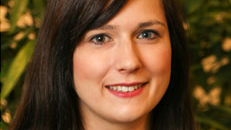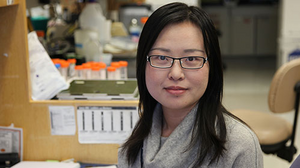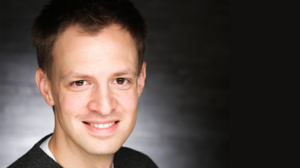Funded researchers: Dr. Julia Velten, Dr. Fangyan Yu & Dr. Timothy Goering
Dr. Julia Velten
Psychology

In epidemiological studies, about 50 % of women report some kind of sexual difficulty during the past year. About 20 to 30 % of women experience low sexual desire, about half of them are troubled by significant personal distress. Pain related to sexual intercourse and problems to reach orgasm are other common clinical phenomena. Sexual dysfunctions are psychosomatic disorders. Thus, physiological and psychological aspects of sexuality are affected. Partnership problems, stressful life events, medical conditions (e.g., diabetes) and mental disorders (e.g., depression) can interfere with sexual function.
Surprisingly little is known about why some women remain sexually functional despite adverse life events, while others develop distressing sexual dysfunctions. To identify predictors of sexual problems is very important, because targeted psychological treatments are not yet available. To develop adequate treatments, knowledge about predispositions, triggers, and maintaining factors of sexual function or dysfunction is crucial. There is evidence that women with sexual problems have the same capacity to react with physiological sexual arousal to sexual stimulation, but do not experience the same levels of subjective sexual arousal. The association between these two levels of sexual response is called sexual concordance. Data regarding sexual problems and concordance in women are mixed. It is still unclear, if women with and without sexual problems differ in their psychological and physiological responses to sexual stimuli.
The main goal of my Gateway Project is to investigate differences in sexual concordance and sexual reaction between women with and without sexual dysfunctions and to identify predictors of sexual response. A deeper understanding of the relationship between sexual problems and sexual response is not only important to understand the etiology of sexual dysfunction, but also to develop effective psychological interventions for women with sexual problems.
Dr. Fangyan Yu
Chemistry and Biochemistry

Autosomal dominant polycystic kidney disease (ADPKD) is a common inherited nephropathy, characterized by the development of renal cysts and various extrarenal manifestations. ADPKD ranks as the fourth cause of kidney failure and is estimated to affect at least 1:600-1: 1000 individuals worldwide. Over 50% of patients diagnosed with ADPKD eventually reach end-stage kidney disease and require dialysis or kidney transplantation. Currently, no cure has been developed due to the unclear disease mechanism.
ADPKD is caused by the mutation in two genes, PKD1 encoding polycystin1 and PKD2 encoding polycystin-2, accounting for 85% and 15% of clinic population respectively. Both polycystins localize to the membrane of the primary cilium, a small projection from the cell surface present in most quiescent mammalian cells essential for cell signaling and development. The defective cilium function or structure causes a variety of diseases known as ciliopathies, including ADPKD. Accumulated data have suggested that the defective localization or loss of polycystin on the primary cilium has a central role in driving the pathogenesis of ADPKD.
My gateway project aims to explore the mechanism of ciliary trafficking of polycystins, with the hope to identify new therapeutic targets for ADPKD. I will conduct my research with Associate Professor Dr. Jing Zhou’s group in the renal division of Brigham and Women’s Hospital, Harvard Medical School, USA. Dr. Zhou is the founding director of the Harvard Center for Polycystic Kidney Disease Research and is an internationally renowned leader on studies of ADPKD with a special focus on cilium. I will use yeast two hybrid screening and mass spectrometry to identify new interaction partners of polycystins. I would also evaluate the role of candidate proteins in regulating polycystin trafficking with cell-based system and transgenic mouse model.
The Gateway fellowship offers a great opportunity for me to perform my interested research in a prestigious laboratory and provide me valuable time to gathering preliminary data for postdoc fellowship application in USA.
Dr. Timothy Goering
History

During my postdoc at Harvard University, I will intensify my research on intellectual history. I will research how the discipline of intellectual history (in German “Ideen-“ or “Geistesgeschichte”) developed in Germany and what main challenges the discipline faces today.
What is intellectual history and why is it important to carry out research on this topic? Broadly speaking intellectual history is a discipline within historical scholarship that studies intellectuals, ideas and intellectual contexts over time. Intellectual historians have studied diverse themes such as philosophical movements (e.g. Existentialism) or entire cultural epochs (e.g. the Reformation), concentrating on how ideas are secured or repressed, and how they spread across the world and influence the lives of people.
In Germany the discipline slowly emerged during the late 19th and early 20th century. Despite its initial popularity, the discipline came under bitter attack in the second half of the 20th century. Most historians in Germany turned to study political history, popular culture or the economy, discarding intellectual history altogether. By the 1990s it is fair to say that the discipline of intellectual history completely vanished in the German academic landscape.
Only in the past few years have there been promising signs of a renewed interest in intellectual history, in Germany and beyond. In my research, I will retrace the history of the discipline of intellectual history in Germany and its transnational entanglements with other national developments. My goal is to understand the history of the discipline of Germany intellectual history, from the late 19th century to the present, and identify the elements of the discipline that remain promising and alive today.


